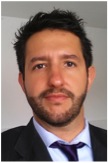Studying at the University of Verona
Academic calendar
The academic calendar shows the deadlines and scheduled events that are relevant to students, teaching and technical-administrative staff of the University. Public holidays and University closures are also indicated. The academic year normally begins on 1 October each year and ends on 30 September of the following year.
Course calendar
The Academic Calendar sets out the degree programme lecture and exam timetables, as well as the relevant university closure dates..
| Period | From | To |
|---|---|---|
| MED ING annuale | Oct 2, 2024 | Sep 30, 2025 |
| MED ING 1° semestre | Oct 2, 2024 | Dec 20, 2024 |
| MED ING 2° semestre | Jan 2, 2025 | Sep 30, 2025 |
| Period | From | To |
|---|---|---|
| Tutti i Santi | Nov 1, 2024 | Nov 1, 2024 |
Exam calendar
To view all the exam sessions available, please use the Exam dashboard on ESSE3. If you forgot your login details or have problems logging in, please contact the relevant IT HelpDesk, or check the login details recovery web page.
Should you have any doubts or questions, please check the Enrollment FAQs
Academic staff
Study Plan
The Study Plan includes all modules, teaching and learning activities that each student will need to undertake during their time at the University.
Please select your Study Plan based on your enrollment year.
1° Year
| Modules | Credits | TAF | SSD |
|---|
2° Year It will be activated in the A.Y. 2025/2026
| Modules | Credits | TAF | SSD |
|---|
3° Year It will be activated in the A.Y. 2026/2027
| Modules | Credits | TAF | SSD |
|---|
4° Year It will be activated in the A.Y. 2027/2028
| Modules | Credits | TAF | SSD |
|---|
5° Year It will be activated in the A.Y. 2028/2029
| Modules | Credits | TAF | SSD |
|---|
6° Year It will be activated in the A.Y. 2029/2030
| Modules | Credits | TAF | SSD |
|---|
| Modules | Credits | TAF | SSD |
|---|
| Modules | Credits | TAF | SSD |
|---|
| Modules | Credits | TAF | SSD |
|---|
| Modules | Credits | TAF | SSD |
|---|
| Modules | Credits | TAF | SSD |
|---|
| Modules | Credits | TAF | SSD |
|---|
Legend | Type of training activity (TTA)
TAF (Type of Educational Activity) All courses and activities are classified into different types of educational activities, indicated by a letter.
Systematic pathology II (It will be activated in the A.Y. 2027/2028)
Teaching code
4S012581
Credits
19
Scientific Disciplinary Sector (SSD)
-
Learning objectives
The training objectives of the course are: The course aims to provide theoretical and practical knowledge on the etiology, pathogenesis, pathophysiology, clinical, diagnostics and prognosis of the main endocrine, metabolic, respiratory, cardiovascular and nephrological diseases, as well as introducing the knowledge necessary to describe and identify the anatomo-pathological pictures related to the aforementioned pathologies.
Pathological Anatomy Module II
The training objectives of the module are the recognition, classification and evaluation of the cyto-histopathological pictures inherent to endocrine pathology and pulmonary pathology.
Cardiac Surgery Module
The training objectives of the module are: to know the pathophysiology, functional semiotics, the classification of the various pathologies of the cardiovascular system subject to surgical intervention; know the technological developments, the therapeutic value and the risks of auxiliary or replacement mechanical systems of the heart; know the principles and techniques of extracorporeal circulation.
Cardiology Module
The training objectives of the module are: to know the cardiovascular anatomy integrated with the function of the cardiovascular system; know the main cardiac pathologies; know the most commonly prescribed drugs in cardiovascular diseases; know the distinctive elements of cardiovascular diseases in chronic and acute patients; know cardiovascular diagnostic tests; know the elements necessary for the differential diagnosis of cardiovascular diseases; know the main systemic pathologies that influence cardiovascular function.
Thoracic Surgery Module
The training objectives of the module are: to know how to use the diagnostics of thoraco-respiratory symptoms, interpreted in relation to their physiogenesis; know the systematic nosography of thoraco-respiratory diseases; know the diagnostic procedures and their indications in respiratory diseases; know the main thoracic surgical techniques.
Vascular Surgery Module
The main training objectives of the module are: to know the signs and symptoms, the main functional alterations and the differential diagnoses of the most frequent diseases of the arterial and venous system; know how to analyze and solve the clinical problems of the above pathologies; know how to evaluate the effectiveness, risks and cost/benefit of diagnostic strategies of the main diseases of the arterial and venous system.
Endocrinology and Metabolic Diseases Module
The training objectives of the module are: to know the etiology, pathogenesis, physiopathology, clinical, diagnostics and prognosis of the main endocrine and metabolic diseases; understand the value of the main clinical (anamnesis, physical examination), laboratory and imaging tools necessary for the diagnostic classification of the main endocrine and metabolic diseases.
Respiratory Diseases Module
The training objectives of the module are: knowing how to use the diagnostics of respiratory symptoms, interpreted in relation to their physiogenesis; know the systematic nosography of respiratory diseases; know the diagnostic procedures and their indications in respiratory diseases. At the end of the module the student should: know the pathophysiology of the key symptoms of respiratory diseases (cough and dyspnoea); be able to describe the pathological anatomy and physiopathology of the main pathological conditions of the respiratory system, also with the aim of better understanding the clinical picture. Of the main diseases of the respiratory system, it is also essential for the student himself to be able to describe the epidemiology, symptoms, methods and main diagnostic investigations, as well as identify the fundamental elements for a correct differential diagnosis.
Nephrology Module
The training objectives of the module are: to know the pathophysiological bases of the main kidney diseases and to identify the underlying pathogenetic mechanisms; learn the main anatomopathological alterations of glomerular, tubulointerstitial and vascular diseases and understand the correlations between anatomical damage, functional alteration and symptom; know the characteristic elements of various kidney diseases; know what information is necessary for clinical evaluation; know the distinctive elements for correct differential diagnostics; know how to use the main laboratory and instrumental investigations to reach the diagnosis. Know elements of therapy for different nephropathies and renal replacement therapy.
Practical Teaching Module of Cardiology, Endocrinology, Nephrology
The training objectives of the module for the cardiology field are: knowing how to recognize signs and symptoms suggestive of cardiovascular pathology; know how to read and interpret an ECG; know how to collect a medical history oriented to the patient with cardiac disease; know which laboratory tests are appropriate for the prevention of thromboembolic diseases and the control of anticoagulant therapy. The training objectives of the module for the endocrinology field are: knowing how to carry out a medical history oriented towards metabolic pathologies, with particular reference to diabetes; be able to provide accurate information to a diabetic patient regarding lifestyle and treatment execution; know how to carry out a rapid blood sugar test; know how to interpret the results of laboratory tests relating to the main metabolic syndromes. The training objectives of the module for the nephrology field are: to acquire the skills necessary to collect a medical history oriented to the patient with renal function problems; know how to interpret the results of laboratory investigations carried out in nephrology patients, with particular reference to the distinctive elements between acute and chronic renal failure.
Examination Methods
Oral examination finalized to verify the knowledge of the course contents.
Evaluation criteria
The student will be assessed separately on each module. The test ascertains the level of knowledge of the theoretical contents and the ability to use language in describing the contents of the program. The average of the marks of the individual modules will determine the final mark. The final vote is considered positive for a score equal to or greater than 18/30.
Free choice courses
Modules not yet included
Career prospects
Module/Programme news
News for students
There you will find information, resources and services useful during your time at the University (Student’s exam record, your study plan on ESSE3, Distance Learning courses, university email account, office forms, administrative procedures, etc.). You can log into MyUnivr with your GIA login details: only in this way will you be able to receive notification of all the notices from your teachers and your secretariat via email and soon also via the Univr app.

 giuseppe.bertini@univr.it
giuseppe.bertini@univr.it
 045-802-7682
045-802-7682








